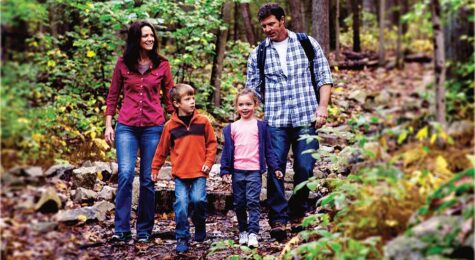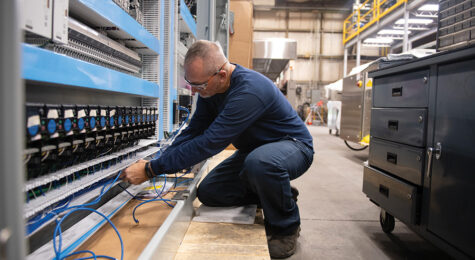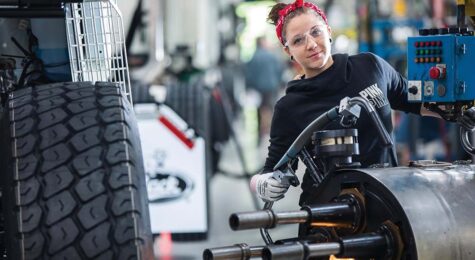Pennsylvania is a Hub for Alternative Farming
Discover four thriving farms that have sidestepped tradition.

Farming has changed a lot over the years. While traditional growing and harvesting practices still exist, people from all over are taking more innovative approaches. In fact, Pennsylvania is a hub for alternative farming, including vertical farming and hydroponics. Ahead, learn more about these methods and four thriving Pennsylvania farms that have sidestepped tradition.
In This Article
No Dirt Farms in Northwest Pennsylvania
No matter the season in Erie County, No Dirt Farms’ greenhouse provides a controlled environment where hundreds of heads of fresh, leafy greens can thrive. Located in Fairview, No Dirt Farms is true to its name; its produce – mostly a variety of lettuce – is grown using hydroponics. This means it’s grown using a water-based nutrient solution instead of soil. The farm also utilizes vertical farming, where crops are grown stacked on top of one another, rather than in horizontal rows.
By implementing these methods, No Dirt Farms saves space without cutting down on productivity, plus it can provide produce to the region all year.
“That was my vision when I started No Dirt Farms – to be able to give people fresh produce year-round because in Erie, we are so limited to anything fresh in these January, February, March months,” says Amanda Hines, who started the farm after shutting down her salon in Fairview.
Now, Erie County residents can enjoy lettuce, tomatoes, eggplant, herbs and a variety of other produce all year.
In addition to being a self-taught farmer, Hines also owns Westside Market on Powell, a marketplace that connects people with local farmers and vendors who prioritize sustainability. The market, which is stocked with produce from No Dirt Farms as well as other farms around Erie County, has made it more convenient for residents to find local produce.
“This is a one-stop shop where you can be supporting everybody,” Hines says.
Lansdowne Urban Farms in Southeast Pennsylvania
Located in the business district of Landsdowne, a suburb of Philadelphia, is a vertical farm blooming with fresh basil, lettuce, and kale.
Owner Jennifer Hoff started the business with her son, Zachary McCann, in response to the pandemic when supply chain issues and food scarcity became a threat. Now, Lansdowne residents can purchase produce straight from the indoor farm.
Lansdowne Urban Farms’ downtown location attracts people interested in vertical farming as well as those who are strangers to the process. Hoff and her son use this as an opportunity to educate the public on where food comes from and how innovative growing methods save space. The farm also hosts field trips and classes for schoolchildren, helping educate the next generation of farmers.
As the agriculture industry continues to face challenges, like disappearing farmland, innovative methods will continue to grow in importance.
“Where we get our food from is going to be challenging moving forward,” Hoff says. “I think we have a responsibility to figure that out.”
GreenWorks Farm in Southeast Pennsylvania
GreenWorks Farm in North Wales is a family-run business started by fourth-generation farmers. Like No Dirt Farms, it specializes in hydroponics. The pesticide-free produce grown here can be found in its farm store as well as restaurants in the surrounding area.
In addition to produce, the farm prioritizes growing the next generation of farmers by providing classes and work study opportunities for youths.
GreenWorks partners with North Penn High School to offer a part-time work study and job training program for high school students. Students can work on the farm a few days a week during the school day to learn skills that will benefit them in an agriculture-related career.

Little Leaf Farms in Eastern Pennsylvania
A new greenhouse facility in McAdoo, located about 30 miles south of Wilkes-Barre, is home to Little Leaf Farms, one of the largest producers of hydroponic baby leaf greens in the country. While based in Massachusetts, the McAdoo location is the company’s second greenhouse in Pennsylvania. The state has been ideal for expansion because of its proximity to large metro areas across the Northeast.
Founder and CEO Paul Sellew started Little Leaf Farms in the hopes of providing fresher produce at a local level, rather than relying on distant distributors.
“We believe that the local food infrastructure needs to be built out,” Sellew says.
With highly automated greenhouses incorporating hydroponics, the 30-acre greenhouse produces the same amount of greens as a 300-acre farm, according to Sellew. The controlled environment greenhouse relies on natural resources like sunlight and rainwater, resulting in a cleaner operation with no emissions. Fungicides, pesticides, and herbicides are never used on Little Leaf Farms’ lettuce, making its products “beyond organic,” Sellew says.
In addition to providing fresh produce to the local community through restaurants and grocery stores, Little Leaf Farms also employs several hundred residents in the region. Feeding Pennsylvania, a network of local food banks, partners with Little Leaf Farms to ensure more people have access to fresh produce.
“Building out our local food system is all part of making our regions more resilient and also investing in those regions and creating opportunities for people,” Sellew says.
This article was sponsored by the Pennsylvania Department of Community and Economic Development.



